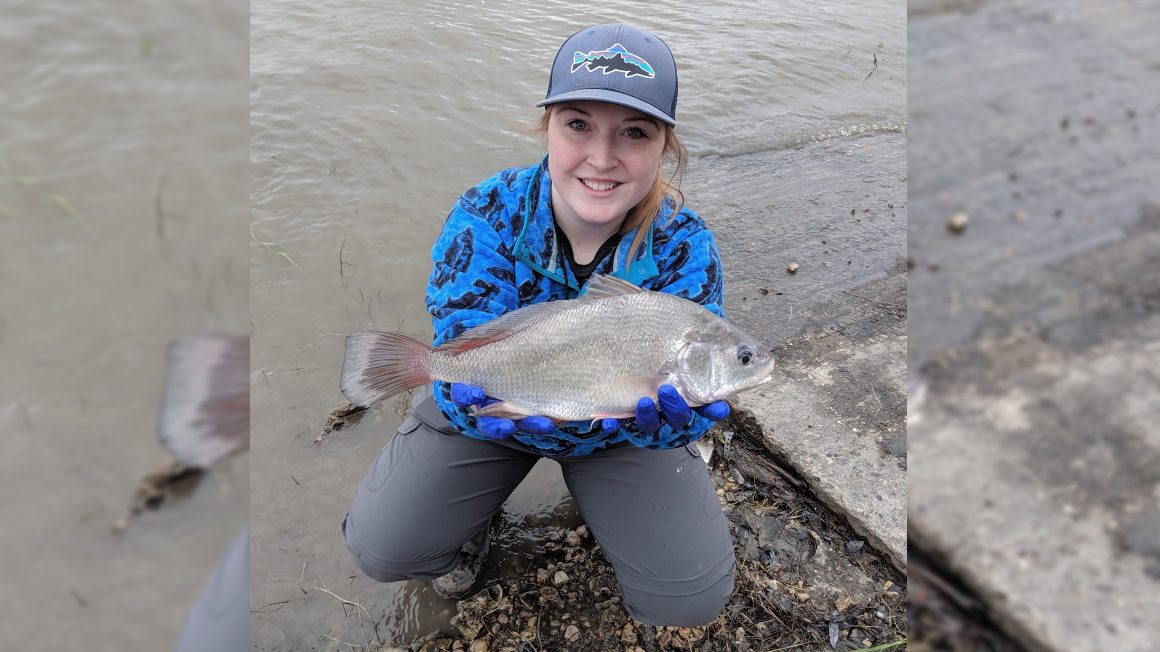In Jamie Card’s field, the study of fish and fish biology, she’s somewhat of an outlier. Though the University of Winnipeg Master of Science in Bioscience, Technology and Public Policy graduate student grew up a self-professed outdoor obsessive, she lacked familiarity with a rod and reel. Sure, she had been fishing a few times, even caught a thing or two, but she was no master angler. Frankly, it was a stretch to call her an amateur.
So, how does one go from inexperienced angler to graduate student researching the impacts of catch-and-release fishing? It all begins with one eye-opening experience. Tasked with finding field research to participate in as an undergraduate student, Card landed at a lab studying fish, and a newfound passion ignited.
“It’s really hands on, you’re in the stream working with fish, and that was what I fell in love with,” Card said. “You’re just working so closely with your study subject that there’s something really special that I don’t even know how to describe. It’s just fantastic.”
Already planning to pursue graduate studies, now Card knew precisely what she wanted to research. And, as Card put it, it didn’t take long for the stars to align. In searching for a graduate studies supervisor, she connected with Dr. Caleb Hasler, an associate professor in the Department of Biology. His aquatic biology research was in lockstep with Card’s interests. She wanted someone with whom she could collaborate, and she found that in Hasler.
Instilling Confidence
We need to make sure the students are fully hirable by all the different sectors that they can be hired in and not just research intensive programs.
Dr. Caleb Hasler
But Hasler’s influence on Card goes well beyond her research, which is focused on the biological responses of catch-and-release angling in understudied fish species and during understudied practices, such as ice angling.
Upon her arrival at UWinnipeg, Card doubted her qualifications and struggled to find belief in her ability to lead and execute her research. However, Hasler’s objective, as it is with every student he supervises, was not only to guide her through her thesis but provide her with confidence and a skillset that would prepare her for her next endeavours.
“The mentoring of the student is the most important,” Hasler said. “What that means is to help them develop as a scientist, critical thinker, problem solver, writer, communicator, those sorts of things. That is the most important role for me.”
Providing Hasler the opportunity to do so is the well-rounded nature of the program, which includes four courses, a research project, and the chance to work with service organizations such as The Wildlife Society, Let’s Talk Science, and the American Fisheries Society, among others. The multifaceted education further broadens students’ skillsets, an asset for those with dreams of careers outside of academia.
“The stats show that most people who start out in undergrad are not going to become professors, so they’re not staying in the academy,” Hasler explained. “They’re going elsewhere – to industry, to government – so we need to make sure the students are fully hireable by all the different sectors that they can be hired in, and not just research intensive programs.”
Dream Job
And as much as she’s proof positive of the personal growth UWinnipeg students can experience – Card noted her growing confidence and attributed it to Hasler’s mentorship – she is also evidence of the efficacy of the program’s diversified studies. Upon becoming interested in aquatic biology, Card had her sights set on work with Fisheries and Oceans Canada (DFO). When Card stumbled across a posting for a fish and fish habitat biologist with DFO ahead of a UWinnipeg job fair, Hasler urged her to apply.
“He said, ‘You have to do that. That’s where we’re trying to get you to here,’” Card recalled.
The same day she interviewed for the post is the same day she was hired. At the time, it meant putting her graduate studies on hold – first for eight months, then extended an additional four months – but Card has since returned to the program with invaluable work experience and remains in a part-time gig with DFO.
As Card wraps up her thesis, which will be submitted to a journal upon completion, Hasler looks back at her time in the program as a tremendous success.
“She’s gone from needing a lot of help with moving things forward in a publication to almost not needing help at all,” he said. “That’s been good to see, because it shows the development of her as a research scientist, a writer, and a thinker, and to me it suggests that I’ve done my job.”
Applications for the 2022-23 Master of Science in Bioscience, Technology, and Public Policy intake will be open in early November 2021.
For more information about the Bioscience, Technology, and Public Policy graduate program, please visit the departmental website or contact Dr. Craig Willis by email at: c.willis@uwinnipeg.ca.

